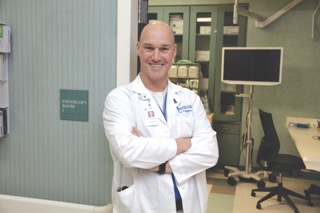Alarming trend in colon cancer
Increased diagnoses seen in younger patients
Over the last 15 years, incidence rates of colon cancer have dropped overall. There are multiple reasons for this, but Travis F. Wiggins, MD, of Gastroenterology Consultants of Savannah, can sum up the most important factor in two words:
“Colonoscopies work,” he says.

Older adults getting their colonoscopy screenings have contributed to these improved overall numbers, but something happens when you take them out of the equation. For people under the age of 50, colon cancer incidence rates have been increasing.
“This continues to be an ongoing trend, unfortunately,” Dr. Wiggins says. “In fact, after years of corroborating data, the recommendation for people at average risk of colorectal cancer is to start screening at age 45.”
Detection And Prevention
Researchers have, so far, not been able to definitively determine why colon cancer rates are rising in those under the age of 50.
“We don’t know,” Dr. Wiggins says. “As with most cancers, there’s not just one smoking gun. It tends to be a culmination of lifestyle factors coupled with changes happening on a genetic and molecular level.”
This is why raising awareness is so important to Dr. Wiggins and his colleagues.
“What I try to make clear to patients is that the recommendation of age 45 is for all people of average risk,” he says. “In the past, if you were under the age of 50 and had no symptoms of colon cancer and no family history, there seemed to be no reason to get screened. But that has changed—if you’re 45 and haven’t had a colonoscopy, it’s time to schedule one.”
The effectiveness of colonoscopy screening has long been confirmed by the data on patient outcomes.
“There’s nothing magic about colonoscopy,” Dr Wiggins says. “It works because it allows us to both find and remove polyps, the growths that occur in the lining of the colon.”
Many polyps are benign, but some can be pre-cancerous or have the potential to become cancerous over time.
“We find polyps and take them out during your colonoscopy,” Dr. Wiggins says. “It is a unique screening in that way. In addition to early detection of cancer, we can actually prevent it, reducing an individual’s risk of getting colon cancer to begin with.”
What Else You Can Do
Dr. Wiggins encourages patients of all ages to take preventative steps for their colorectal health. This includes knowing your family history and bringing it to your doctor’s attention, especially if a family member was affected by colon cancer under the age of 60.
Management of modifiable risk factors is also essential to both reducing cancer risk and preventing other chronic diseases. These tips include all of the classics:
- Regular exercise
- Balanced diet (high in fruit, vegetables, and whole grains; low in red or processed meats and saturated fat)
- Minimizing alcohol consumption and quitting smoking
Dr. Wiggins also stresses the importance of noticing symptoms and getting them checked out quickly.
“Persistent rectal bleeding at any age, unexplained weight loss, or progressively worsening abdominal pain should prompt a medical evaluation,” Wiggins says.
Old-Fashioned Notions
A shift in colon cancer awareness requires not just a focus on educating younger people, but also retiring older ideas about screening. Some of the most common concerns have been misconstrued, including:
- “I can’t handle the prep.” There are actually low-volume and split dose options for patients who are worried about the infamous gallon of prep. Talk with your doctor about the best way to make this crucial step manageable.
- “It will be painful.” Actually, most people sleep right through the procedure and wake up with no memory of it.
- “I’ll have a hangover from the sedation.” Patients will need a ride home and cannot drive for the rest of the day, but the quick-acting sedation also wears off just as quickly. Symptoms of grogginess or nausea have shown to be much milder than in the past.
- “It’s embarrassingly invasive.” Gastroenterologists and their surgical teams understand the sensitive nature of a colonoscopy and do everything in their power to make it a respectful, private experience. They perform thousands of colonoscopies each year and their focus is only on one thing—finding and removing polyps in order to prevent colon cancer before it starts.
Gastroenterology Consultants of Savannah is the presenting sponsor of the Get Your Rear in Gear 5K Run/Walk at the Nancy N. and J.C. Lewis Cancer & Research Pavilion on March 29.
The funds raised at this event will stay in our community, helping with prevention, early detection and treatment, and healthy living projects for colon cancer.
Want to be a part of it? Learn more and sign up here: runsignup.com/Race/GA/Savannah/GetYourRearinGearSavannah